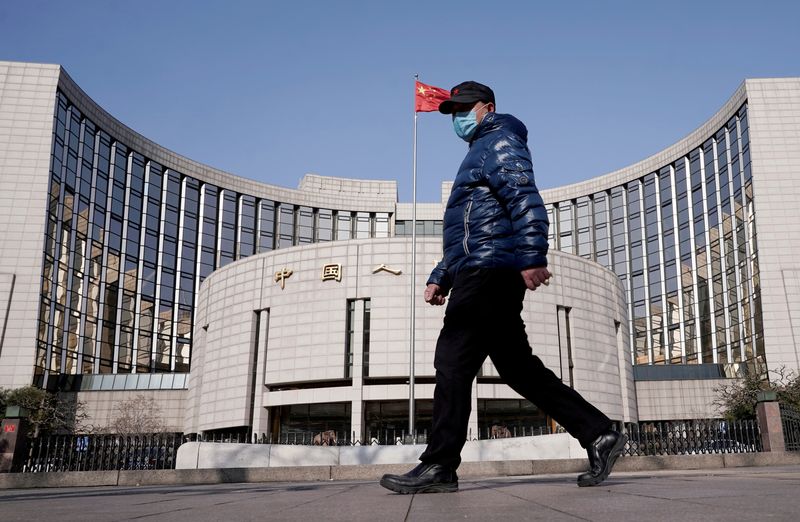SHANGHAI (Reuters) - China's central bank is likely to fully roll over maturing medium-term policy loans while keeping the borrowing cost unchanged for the third straight month this week, a Reuters survey showed.
Worsening COVID-19 outbreaks across the country in recent weeks and weak demand from both home and abroad have weighed on the world's second largest economy, with a slew of recent economic data pointing to a further loss of momentum.
Meanwhile, global tightening was yet to see a clear sign of pivot, limiting Beijing's room to manoeuvre its monetary easing.
In a poll of 31 market watchers this week, all participants predicted that the People's Bank of China (PBOC) would keep the interest rate on the one-year medium-term lending facility (MLF) unchanged at 2.75% on Tuesday.
Among them, 22 respondents anticipated the PBOC to fully roll over 1 trillion yuan ($142 billion) worth of such loans due to expire on the same day.
In the remaining nine traders and analysts, five expected a partial rollover, while the other four believed that the central bank would inject additional fresh funds to support the slowing economy.
"We expect a full or near-full rollover to support liquidity while the chance for a reduction in the reserve requirement ratio (RRR) to replace part of the facility appears slim as policy measures are targeted," said Frances Cheung, rates strategist at OCBC Bank.
The heavy MLF loan maturity of 1 trillion yuan, the biggest this year, prompted some market debates whether the PBOC would cut the amount of cash banks must set aside as reserves to make up the liquidity shortfall, but some traders said a RRR reduction would be too strong a policy easing signal.
China, along with Japan, has been a major outlier in the global tightening spree with Beijing focused on stimulating its COVID-hit economy. But investors have been worried that the widening monetary divergence could trigger capital outflows and yuan depreciation.
China's decision to lower the MLF rate in August widened the yield differentials against the United States and accelerated yuan's declines. [FRX/]
China's central bank "is walking a fine line between stimulus and financial instability as too much credit-fueled activity was the ultimate source of the current property market slump," said Win Thin, global head of currency strategy at Brown Brothers Harriman.

Official data showed that new bank lending in China tumbled more than expected in October from the previous month while broad credit growth slowed, as COVID-19 outbreaks and a property sector downturn weighed on credit demand.
($1 = 7.0414 Chinese yuan)